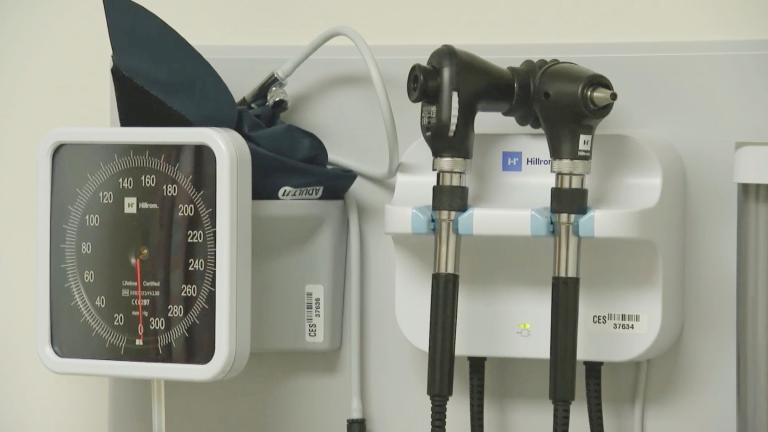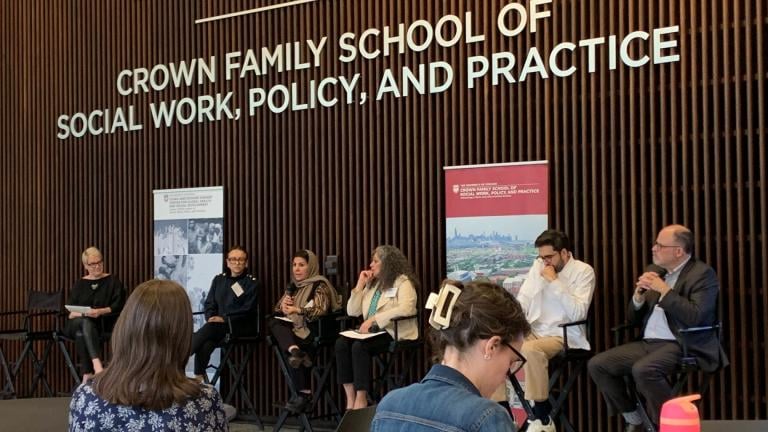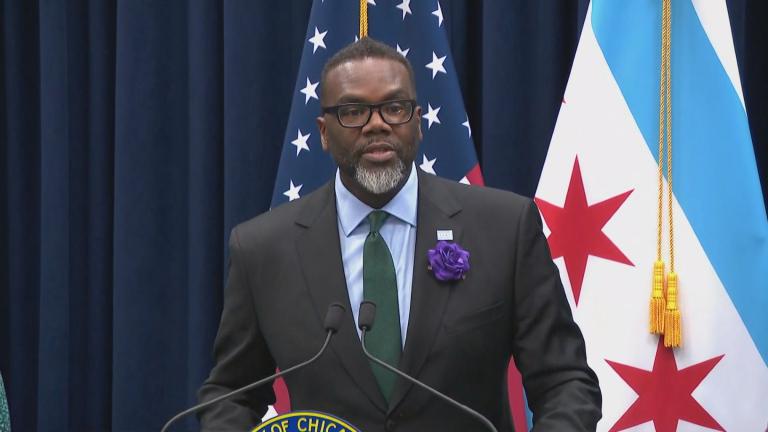Mayor Brandon Johnson set aside $150 million to cover the cost of housing, feeding and caring for the men, women and children sent to Chicago from the southern border in 2024, even though that is less than half of what the city will have spent to care for Chicago’s newest arrivals through the end of 2023.
Since the first group of migrants sent to Chicago on a bus by Republican Texas Gov. Greg Abbott arrived nearly 14 months ago, more than 18,000 people have made their way to Chicago, straining the city’s social safety net and exposing deep tension between Chicago’s Black and Latino communities. The city is currently caring for nearly 11,000 of those new arrivals, city data shows.
“Chicago is a place strong enough to welcome and embrace newcomers while honoring our commitments to those who are already here, especially those who have long suffered disinvestment,” Johnson said.
In the past week, 63 buses arrived in Chicago from Texas, carrying 3,600 people, said Cristina Pacione Zayas, Johnson’s first deputy chief of staff.
The migrant crisis is likely to cost taxpayers $361 million between January and December 2023, an increase of more than 4% in the past week, according to updated financial projections released Thursday by the mayor’s office.
In September, the mayor’s office said approximately $200 million of city’s projected 2024 budget deficit of $538 million was due to the expected cost of caring for the migrants sent to Chicago.
Johnson asked the City Council to earmark less than the full projected cost to care for the migrants to acknowledge that the burden should not fall entirely on Chicago taxpayers, Pacione Zayas told reporters in a virtual briefing on Thursday.
“This should not just be on the shoulders of Chicago,” Pacione Zayas said, noting that immigration is a responsibility of the federal government.
The arrival of Chicago’s newest residents has become a humanitarian crisis — with more than 3,775 migrants living in police stations across the city and at O’Hare International Airport with another 10,852 migrants living in city shelters as of Thursday. Johnson said the crisis was caused by “right-wing extremists bent on sowing chaos and division in our city.”
The number of people living in police stations and at O’Hare has risen nearly 18% in the past seven days, with the number of people living in city shelters rising more than 6%, according to city data.
In his budget speech, Johnson cast the arrivals of the migrants as the latest in series of waves of immigration that has shaped, and reshaped, Chicago and is central to the city’s identity.
“They see this nation and our city as a beacon of hope, like so many immigrants before,” Johnson said. “Now how we support those who seek refuge in our country and in our city, it speaks to our values.”
In addition, Johnson vowed not to “flinch” in the face of that pressure and to continue to welcome the migrants, all of whom are in the country legally after requesting asylum after fleeing persecution and economic collapse.
Johnson’s budget also proposes creating a 13-person Office of New Arrivals as part of the Department of Family and Support Services with a total budget of $1.2 million.
But Johnson made it quite clear that the city cannot handle the crisis on its own, and pleaded with state and federal officials to “provide greater coordination, collaboration and resources dedicated to this issue.”
“Because we are the city of Chicago, we will continue doing our part,” Johnson said. “And we call upon our partners to do theirs.”
However, neither Gov. J.B. Pritzker nor House Speaker Emanuel “Chris” Welch have given any indication they would support a measure providing the city with additional aid as part of a supplemental budget measure during the coming fall veto session in Springfield.
The state has provided $330 million to the city of Chicago to care for the migrants who arrived during the first phase of the crisis between August and December 2022, according to Pritzker’s office.
Two weeks ago, the governor’s office announced that the city would get an additional $30.25 million to care for the city’s newest arrivals.
Pacione Zayas said she was confident that there would be other ways for the state to provide the city with additional funding outside of a supplemental budget amendment.
Chicago officials are “finalizing” plans to build what they call “winterized base camps” to house the migrants living at O’Hare and police stations, said Pacione Zayas, who added that an announcement was “imminent.”
Johnson and his aides have defended the plan to open the massive tents, which could shelter, feed and care for as many as 1,000 migrants in a single location, as the best — and only — option available to the city, given the lack of available existing buildings that can be converted quickly into shelters.
Johnson has been deluged with criticism for his decision to partner with the state of Illinois and pay $29 million to GardaWorld Federal Services to erect the tents to house the migrants, even as that firm contracted with Florida Gov. Ron DeSantis to move migrants to states led by Democrats, according to the Tampa Bay Times. That contract was never executed, according to a statement from company officials to WTTW News.
Pritzker has also criticized Johnson’s plan for the tents, telling reporters it would be better to house the migrants in unused federal buildings.
Those remarks opened a public breach between the mayor and the governor, who have otherwise been in lockstep. The remarks came as Johnson and his allies are under increasing pressure from their progressive supporters, many of whom are furious that he would partner with a firm willing to help a Republican politician transport migrants to states and cities controlled by Democratic leaders as part of an effort to harm President Joe Biden’s chances for reelection.
Ald. Carlos Ramirez Rosa (35th Ward), the mayor’s floor leader, called on state officials to open and operate migrant shelters to ease the burden on Chicago officials and taxpayers.
Contact Heather Cherone: @HeatherCherone | (773) 569-1863 | [email protected]








